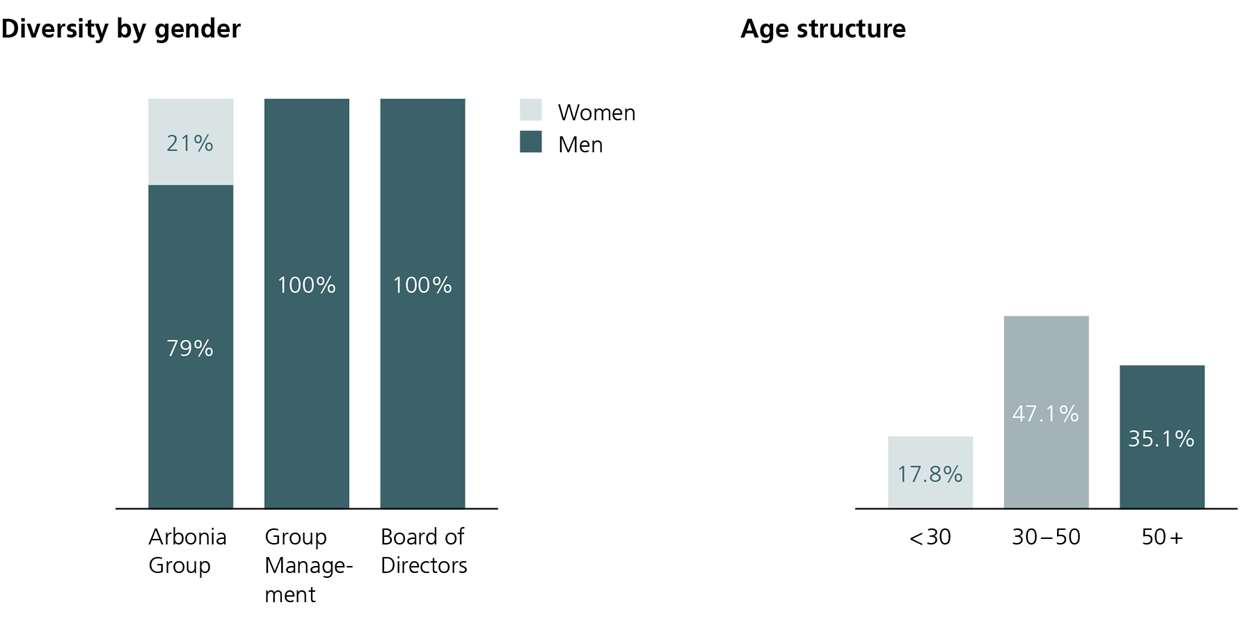Dynamic corporate culture
As Arbonia, we live a dynamic, open corporate culture. In doing so, we always aim to create a pleasant, appreciative and supportive work environment. Wages, social benefits, employment level, contract set-up and compensation are to follow the principles of a responsible Group. For this purpose, three central leadership principles were determined: Firstly, colleagues maintain a personal and direct relationship among each other and are open to ideas or other points of view. Secondly, day-to-day business is characterised by pragmatism and realism; decisions are based on facts. Thirdly, managers take time for their employees and regard them as people, not just workers.
These principles also apply to the development of employees in addition to the day-to-day work. With our HR work, we want to help people reach their full potential and we invest in internal and external further training for this purpose.
Such a work environment is demonstrated by motivated and satisfied employees. This increases competitiveness and is reflected in a lower gross fluctuation rate (incl. retirements). In the reporting year, however, this increased slightly from 9.8% in the previous year to 10.7%. To maintain and optimise our high level as a fair employer in line with the market, we regularly compare ourselves with other internationally active companies of a similar size.
Within the corporate group, the respective HR officers of the divisions as well as of the Group are responsible for the further development of the Arbonia culture. They report to the CEOs of the divisions or the Group CFO. A regular exchange among the HR officers ensures that corresponding impulses are perceived in all companies.
We place great value on diversity among the employees. This includes values such as equal opportunity, non-discrimination, as well as equal treatment at the company – regardless of sex, citizenship, ethnic origin, skin colour, religion or impairments. Although the labour market is regulated differently in each country, the overarching guidelines of the Group and the divisions apply for Arbonia at all sites.
Close social partnership
The close cooperation with all employee representatives in all countries is a decisive factor our business success. In Switzerland, the collective labour agreement of the Swiss mechanical, electrical and metalworking industries (Swissmem) is applied at all companies, unless other mandatory collective labour agreements are in effect. The contacts with the social partners in Switzerland therefore generally take place through this association. Most of the German companies are also subject to collective labour agreements – either via an in-house wage agreement or the regional collective agreement of the trade unions.
The Arbonia Board of Directors approves all important internal frameworks and general agreements. These include the Code of Conduct (see "Ethics and integrity"), the salary system, leadership development, collective labour agreements and wage agreements, as well as the strategic guidelines for HR development over all levels down to the local sites. The divisions receive support from the Group in succession planning and management development as well as in recording key performance indicators. In addition, personnel matters are also discussed and addressed across divisions depending on their relevancy.
Employees can see the conditions of the respectively valid wage agreements on information boards and screens at the production plants at all times, in addition to through communication by the social partners themselves. At the same time, there is no uniform procedure for the entire group, since the requirements differ according to the company and local regulations. However, regular meetings take place between the managements and employee representatives from the trade unions everywhere. When an employment relationship is terminated, the divisions have a standardised process.
Training programmes as a matter of course
The number of trainees, who mainly work at Kermi, Prüm and Garant in Germany, declined minimally – from 156 in the previous year to 153. As Arbonia we support the vocational further development of employees with internal and external further training and contribute to the majority of costs. At some sites, we also annually offer dual study places in order to support young college students in a practical way. Employees are prepared for new requirements with internal and external training. In addition to specialist further training, this also includes seminars for strengthening methodical expertise, educational leave, advancement qualification and courses on project management. Training rooms and exhibits at the production sites offer employees the possibility to familiarise themselves with the manufacturing processes as well as with the product application. We determine the need for further training with the help of annual employee interviews as well as through the close cooperation between supervisors and the Human Resources department. In principle, any employee can take part in further training. It must follow a clear objective, however. This applies to internal as well as external programmes. The quality of further training is evaluated by employees after the completion of the programme and the supervisors and external training institutions sometimes also fill in an evaluation form.
Composition of the workforce as of 31 December
¹ Without the Termovent, Cicsa and GVG companies acquired in 2021.
² Without the Joro and Cirelius companies acquired in 2022.
³ Such employees were mainly employed in logistics, assembly and production in the reporting year.
Heating, Ventilation and Air Conditioning Division
Target-oriented for higher employee satisfaction
The companies of the HVAC Division have set themselves high targets as part of their dynamic corporate culture. The aim is to quickly react to changing conditions. A low fluctuation rate and a high employee satisfaction remain core objectives. HR development measures are to contribute to this. As a further objective, the division pursues the integration of employees with a migration background.
The Corbetta (IT) site reviews the satisfaction of its employees every two years through a survey. In addition, mental health and work-related stress factors are also analysed. The evaluation is presented to the Managing Director and various measures are derived on the basis of this data.
To fill vacant positions quickly with qualified people, the division would like to place greater emphasis on employer branding. The company aims to overcome the demographic development through targeted recruiting of new employees and increased retention of existing ones. In Italy, the division intends to promote employee satisfaction with an exchange programme for highly qualified employees in partnership with a sector-related company. The success of these measures is measured based on the key performance indicators and the fluctuation rate. The division offers various work and part-time models and enables mobile working if technically possible.
Talent acquisition and retention
At the HVAC Division, vacant leadership positions are mostly filled internally with the division’s own junior staff. The shortage of skilled workers, however, remains one of the greatest challenges for the division and is evident in longer recruitment processes. This problem is cushioned by the low fluctuation rate and the long periods of employment. The division always strives for non-discrimination and gender-neutral recruitment processes in personnel recruitment.
Doors Division
Corporate culture as part of corporate identity
The division regards a dynamic corporate culture as an important part of employer branding. It also reflects the social responsibility of the individual companies and has a correspondingly high priority.
Measures in the corporate culture area
Measures for retaining employees include increased efforts in the area of HR development or an improved integration of employees with a migration background. A clear employer branding aims to better emphasise the characteristics of the individual companies (see introductory interview in the chapter). As a result, the Doors Division hopes to fill vacant positions more quickly with qualified employees. In addition to reducing the fluctuation rate, Garant also want to shorten the length of the filling process, among other things with professional onboarding systems as well as by developing new key performance indicators in human resources. In general, the division aims to counter changing conditions faster and more flexibly. The progress in achieving these objectives is checked using key performance indicators such as the fluctuation rate or period of employment. At Invado, the targets – which also include a further diversification of the top management, which is currently 40% women – are reviewed by external audits at regular intervals.
At Prüm, views on culture and cooperation in the workforce were surveyed as part of a psychological risk assessment. The results are discussed with the employees in workshops.
Qualified workers
In the Glass Solutions Business Unit, the shortage of skilled workers became apparent during recruitment in the reporting year. This especially affected employees in production and qualified specialist personnel. As in the past, it was possible to fill the majority of vacant leadership positions internally. The promotion of young employees and the hiring of graduates proved to be a great advantage in this respect once again. Nevertheless, the lack of skilled employees remains a challenge despite the low fluctuation rate and longer periods of employment.

